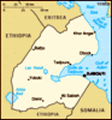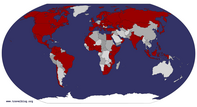Advertisement
Published: January 21st 2016
There was a video doing the rounds on social media a couple of months ago of a scuba diver in a lake in Iceland diving the gap between the Eurasian and the North American tectonic plates. Well that’s not the only place you can squeeze yourself between continents. Djibouti is the triple junction of the African, Somali and Arabian plates and in the Bay of Ghoubbert, as long as you are quite skinny, you can get a hand on Africa, another on Arabia, and push the continents apart.
It was a different and equally undiscovered underwater attraction that brought me here originally. I’ve snorkelled with whale sharks once before in Mexico, and as magical as the few minutes were when it was only me and the giant fish, soon about a dozen boats showed up and dumped another 80 people on our heads. As you would expect, big fish just swam off into the depths. Djibouti is supposedly the opposite. You will be the only boat surrounded by 100s of whale sharks. November to March is the season but they were late this year so trips weren’t running yet. Hence I got myself on an overnight dive trip

 Djibouti
Djibouti
Following the first rain of the year (in November).to “dive the crack”. Good job I did; not a huge amount more to do in Djibouti.
Getting into Djibouti wasn’t straightforward from Somaliland. I’d opted for the 35 minute flight rather than the 24 hour drive on a desert track but had timed this with the first rains of 2015. Consequently, storms over the Horn were playing havoc with flights. There are no information boards or announcements in Hargeisa Airport; when a plane shows up, you put down your always excellent Somali camel milk tea and walk out onto the tarmac to find out where the plane is going. “Djibouti? No, Nairobi.” Sit down again. “Djibouti? No, Addis Ababa.” Sit down again. After about 6 hours an airport employee actually came and told me my flight was here and he put me in a queue getting on to a plane. As we neared the steps a fellow passenger asked me where I was going. “Djibouti.” I told him. “Well this plane is going to Mogadishu.” I left that queue sharpish. All the while a real plane; an Airbus rather than the little twin propeller things, had been sitting on the tarmac. I’d previously read lots of
warnings about flying Daallo Airlines, Somalia’s biggest airline, so I’d booked with Jubba Airways; still a Somalian airline but a newish one and with a snazzy website that actually worked – good enough for me. This big plane was Daallo but when I went and had a word they were going to Djibouti, looked at my ticket and told me to get on. I was greeted at the top of the steps by a very glamorous Russian air hostess, quite a contrast to the completely covered Somali women. She told me to sit where I wanted but she recommended over the wing, hmm. A few more people got on, a total of 18 thus there were about 200 free seats, then we shut the doors and started taxiing. I’m not usually a nervous flyer but the Egypt crash had happened just a few days before and this plane was held together with duct tape; at least much of the inside was. The advice to sit over the wing didn’t help because I then had a close up of the rust on the flaps and the engine. Thick grey clouds with thunder and lightning added to the tension as we bounced
and juddered down the runway. Then after holding my breath for the entire 35 minutes we landed in what seemed to be a military base (more on that in a minute).
You can get a Djibouti visa on arrival, some sources claim. I confirm that you can, but you need confirmation of onward travel and hotel reservations, or you need to be a good blagger. I didn’t have any reservations. Lots of countries claim to want them but I had never had to actually produce them until Djibouti. But I didn’t have any. I tried to explain that I would be staying on a dive boat so didn’t have a hotel reservation but in the mix of English and French we were speaking this somehow got understood that I was a sailor and I was sent to some different official to produce my “seaman’s book”. Soon enough I was sent back again to where I started. After about an hour had passed with everyone just shaking their heads at me, they hooked up my phone to the airport staff’s wi-fi so I could show them my reservation for the dive trip with my thumb hiding the “overnight”
part of the trip so I could blag it lasted four days. This got me transferred to a big boss in a different office where I was greeted by a hello in Somali. Luckily, I’d learnt a few phrases over the previous week in Somaliland so could respond in Somali with; “Kalab wanaagsen, iscoworan?” (Good afternoon, how are you?” – that’s probably not even close spelling-wise but it sounds right). Suddenly we were best mates, he shook my hand violently and put the stamp in my passport straightaway. I was in.
Djibouti city is alright. Mostly on a peninsular so you are never too far from the sea. The old part is a mix of Arabic and French architecture with colonnades and palm trees. The population are a mix of Yemeni, Somali, Afar and French and if four people pass you on the street it is easy to pick out who is what. There are plenty of juice stalls and little pubs to get a drink and watch the world go by.
The rest of Djibouti is barren barren barren. The desert is mostly bare rock and it is fiercely hot most of the
year. But put your head under the water, and you’ll find Eden. Very colourful, very pretty corals, full of very colourful, very pretty fish. A big comfortable wooden boat took us out to the Bay of Ghoubbert, first of all passing the extensive port. The port is actually predominantly for Ethiopia. Being landlocked and not getting on with Eritrea means Djibouti is the only way in and out for Ethiopian imports and exports. And this forms almost the entirety of Djibouti’s economy; much of the rest is rent from various militaries. The US and the French have a huge military presence here and share the runway with the commercial airport. When you hear of drone strikes in Yemen or in Somalia, this is where they will have been sent from.
If you’ve ever researched a visit to Djibouti you will have undoubtedly come across the obscene cost of pretty much everything. Hotels are $200+ per night, a beer is the same price as London, and if you want to do a 4x4 trip to the apparently otherworldly Lac Assal or Lac Abhe you are looking at around $600 for the day. The lack of budget hotels is
not completely true; there are grotty hotels around that would be under $10 anywhere else but in Djibouti you still pay $50/night. And they are currently full of better off Yemenis fleeing the conflict just across the sea. Thus I joined couchsurfers. Originally for the selfish reason of not wanting to pay a fortune for a grotty bed. However, it turned out to be a fantastic experience. My host was overwhelmingly generous. Not just with the family home and food but also with introducing me to his friends and particularly with imparting his knowledge about all things political, economic, religious and everything else I cared to know about this corner of the world. Thank you very very much Barryck and his family, I’m forever indebted.
But before all this, there was the crack. The divemaster told us that the frequent earthquakes mean no two dives are the same as various faults part, close, shift, and previously open passages may now be blocked whereas new ones may have opened. The fault is a deep diagonal crack with eerie beams of sunlight shining through the fan corals that line the walls. In parts it is less than half a
metre in width and you have to wriggle to get through. The pocket of my shorts got snagged at one point (yes the water is far too warm for a wetsuit) and I momentarily had thoughts of an earthquake leaving me squashed like Han Solo and Luke Skywalker in that Death Star rubbish compactor. It’s always nice to do a dive that’s a bit different rather than just corals and fishes and this one ticked all the right boxes.
I was the only tourist on the dive boat; everyone else, all from various parts of Europe and the US, lived and worked in Djibouti. They were an interesting bunch, working for NGOs, embassies or consultancies and said life in Djibouti was pretty good, especially during the colder season – which is when the temperature drops below 40
oC for about a week. Though they all dived a lot just for something to do at the weekend.
Overall I didn’t expect much from Djibouti but enjoyed my time there. There is more to do if you go west into the Danakil Depression or north into the mountains by the Eritrean border but to do that you
ought to come in a group to share the huge travel costs. I met some really interesting people and will undoubtedly have a go at couchsurfing again somewhere in the future. Maybe even back in Djibouti again when the whale sharks are in town.
Advertisement
Tot: 0.085s; Tpl: 0.014s; cc: 16; qc: 33; dbt: 0.0454s; 1; m:domysql w:travelblog (10.17.0.13); sld: 1;
; mem: 1.2mb














littlewing
Cindy
Awesome blog!
Thanks - a new one to add to the list! Great read.